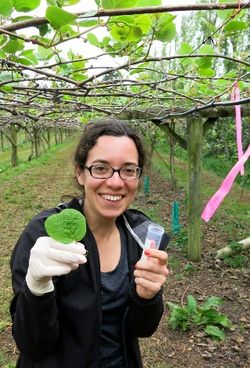24.8.: Gastvortrag: Ecological genetics of resident Pseudomonas syringae on kiwifruit

Christina Straub is a Postdoc in the Rainey lab in New Zealand (which has since moved to the Max Planck Institute for Evolutionary Biology, Plön) at the New Zealand Institute for Advanced Study (Massey University, Auckland). Her research centers broadly around the composition and structure of bacterial populations with a focus on Pseudomonas syringae, and how genetic structure is impacted by a variety of factors, in particular ecological factors.
Abstract:
New Zealand is the third biggest exporter of kiwifruit worldwide making it a billion-dollar industry. In 2010 the outbreak of bacterial canker of kiwifruit (P. syringae pv. actinidiae, Psa) devasted the industry and resulted in the destruction of almost all of the gold kiwifruit (cultivar ‘Hort16A’) orchards.
The disease cycle of Psa starts on the leaf, where upon arrival the bacteria multiply until the plant is invaded via stomata, trichomes or wounds and ultimately cause disease. Plant leaves are densely occupied by a diverse range of microorganisms, which facilitates intra- and interspecific interactions. These interactions can have effects on population structure and the infection process.
Pseudomonas syringae, is a ubiquitous plant pathogen, which infects a variety of plant hosts, but is also regularly found on the leaf surface as a commensal. We investigated the population structure and genetic diversity of a broad range of co-occurring P. syringae isolated from infected and uninfected kiwifruit plants during the current outbreak of Psa. After recovering a novel clade of P. syringae (Phylogroup 3a), which was found to be associated with kiwifruit on a global scale, we performed a variety of competition experiments to unravel the interaction dynamics between co-occurring isolates and the pathogen Psa. Since the presence of the commensal isolate inhibited the growth of Psa, we subsequently used a comparative genomics approach to explore the potential role of these strains in the evolution of virulence, along with pathogenicity assays on different cultivars of kiwifruit.
This talk will be the culmination of five years’ work dedicated to investigate the potential of co-occurring bacteria in the evolution of pathogenicity and ultimately in helping to prevent further outbreaks of bacterial canker of kiwifruit and to save the golden kiwifruit.





